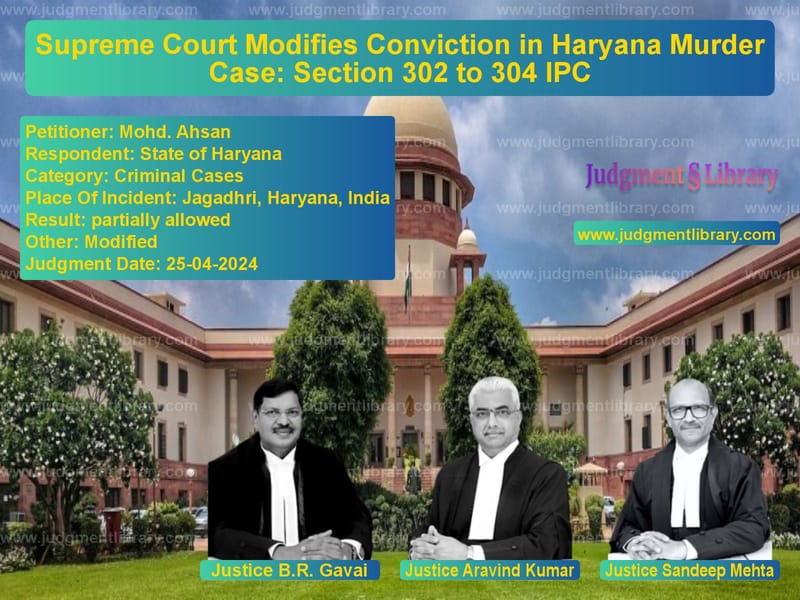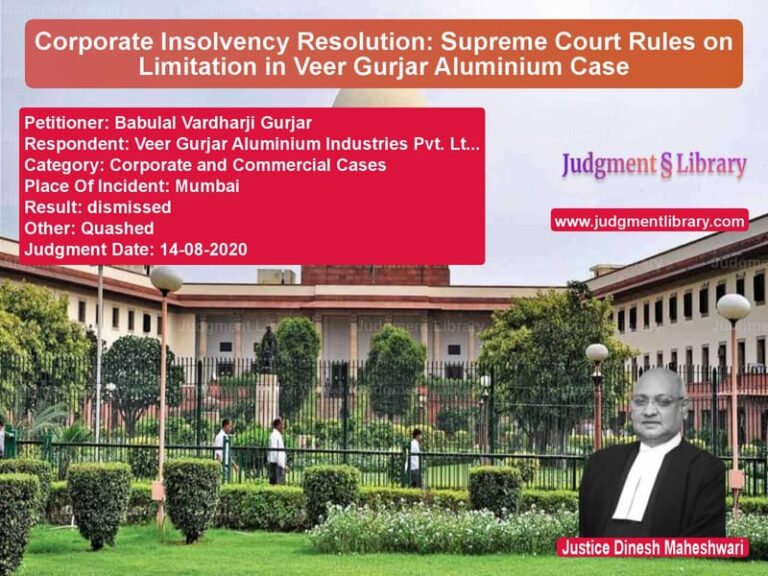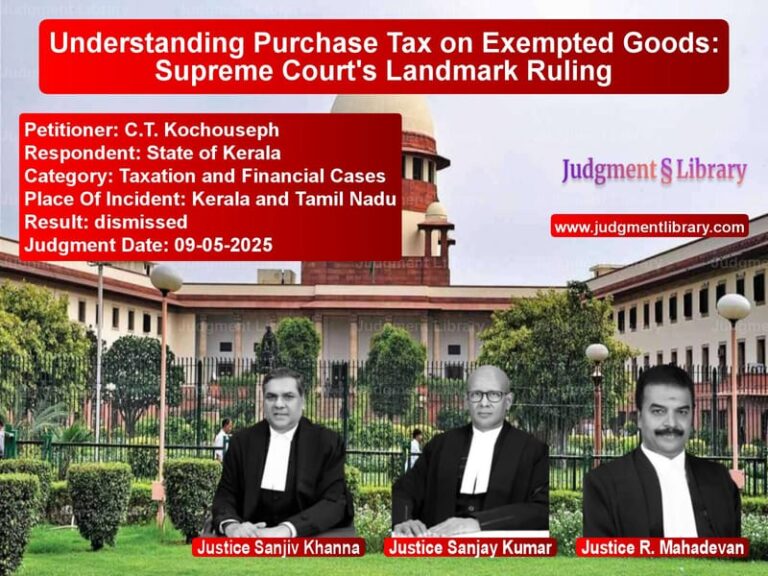Supreme Court Modifies Conviction in Haryana Murder Case: Section 302 to 304 IPC
The Supreme Court of India has delivered an important judgment in the case of Mohd. Ahsan vs. The State of Haryana, modifying the conviction of the appellant from Section 302 IPC (Murder) to Section 304 Part I IPC (Culpable Homicide Not Amounting to Murder). The Court ruled that the incident occurred in the heat of passion without premeditation and fell under Exception 4 to Section 300 IPC.
Background of the Case
On August 17, 2005, at approximately 11:30 PM, an altercation broke out at Shiv Dhaba in Jagadhri, Haryana. The appellant, Mohd. Ahsan, was having food when the victim, Vikrant @ Chintu, called the waiter using the word “hello.” The appellant misinterpreted this as directed at him and reacted aggressively, leading to a verbal and physical confrontation. The situation escalated when the appellant retrieved a glass bottle from his car, broke it, and attacked Vikrant, inflicting multiple injuries. Vikrant was rushed to the hospital but succumbed to his wounds.
Legal Proceedings
Trial Court
The Sessions Court found the appellant guilty under Section 302 IPC and sentenced him to life imprisonment with a fine of Rs. 10,000.
High Court
The appellant challenged the conviction before the Punjab and Haryana High Court, which upheld the trial court’s verdict, dismissing the appeal.
Supreme Court
The appellant filed an appeal before the Supreme Court, arguing that the case should fall under Section 304 IPC instead of Section 302 IPC since the incident occurred without premeditation.
Arguments by the Appellant (Mohd. Ahsan)
- The altercation was sudden and without any pre-planned intent to kill.
- The attack happened in the heat of passion after a verbal exchange.
- The appellant did not take undue advantage or act in a cruel manner.
- Under Exception 4 to Section 300 IPC, the act should be classified as culpable homicide not amounting to murder.
Arguments by the Respondent (State of Haryana)
- The appellant intentionally caused fatal injuries with a broken bottle.
- Five deep wounds on the victim’s body indicated an intent to kill.
- Both the trial court and High Court had found the case fit for a murder conviction.
- The appellant acted violently and had the opportunity to retreat but chose to attack.
Supreme Court’s Judgment
The Supreme Court partially allowed the appeal, modifying the conviction to Section 304 Part I IPC. The key observations were:
1. The Incident Occurred Without Premeditation
- The altercation started over a trivial issue (calling the waiter), and the attack was not planned.
- The appellant and victim had no prior enmity.
- The attack took place in a fit of rage, making it a case of culpable homicide.
2. Exception 4 to Section 300 IPC Applies
- The Court ruled that the case met the criteria of Exception 4:
- The act was committed in a sudden fight without premeditation.
- The attack was made in the heat of passion upon a sudden quarrel.
- The appellant did not take undue advantage or act in a cruel or unusual manner.
3. Modified Sentence
- The conviction was altered from Section 302 IPC (Murder) to Section 304 Part I IPC (Culpable Homicide Not Amounting to Murder).
- The appellant was sentenced to 8 years of rigorous imprisonment and fined Rs. 5,000.
- In case of non-payment of the fine, an additional 3 months of imprisonment was imposed.
- The time already spent in custody was to be deducted from the sentence.
Legal Implications of the Judgment
This judgment clarifies the distinction between murder and culpable homicide:
- Absence of Premeditation: If a fight is spontaneous, the offense may not qualify as murder.
- Sudden Provocation Matters: The law differentiates between planned killings and heat-of-the-moment crimes.
- Judicial Consideration: The Court must evaluate intent, weapon used, and conduct of the accused.
Conclusion
The Supreme Court’s ruling in Mohd. Ahsan vs. The State of Haryana highlights the importance of distinguishing between murder and culpable homicide. The judgment ensures that legal interpretations consider the nature of an altercation, intent, and provocation before determining a sentence. By modifying the conviction, the Court upheld the principle of proportionality in criminal sentencing.
Read also: https://judgmentlibrary.com/supreme-court-orders-juvenility-inquiry-in-bihar-murder-case/
Petitioner Name: Mohd. Ahsan.Respondent Name: State of Haryana.Judgment By: Justice B.R. Gavai, Justice Aravind Kumar, Justice Sandeep Mehta.Place Of Incident: Jagadhri, Haryana, India.Judgment Date: 25-04-2024.
Don’t miss out on the full details! Download the complete judgment in PDF format below and gain valuable insights instantly!
Download Judgment: mohd.-ahsan-vs-state-of-haryana-supreme-court-of-india-judgment-dated-25-04-2024.pdf
Directly Download Judgment: Directly download this Judgment
See all petitions in Murder Cases
See all petitions in Attempt to Murder Cases
See all petitions in Judgment by B R Gavai
See all petitions in Judgment by Aravind Kumar
See all petitions in Judgment by Sandeep Mehta
See all petitions in partially allowed
See all petitions in Modified
See all petitions in supreme court of India judgments April 2024
See all petitions in 2024 judgments
See all posts in Criminal Cases Category
See all allowed petitions in Criminal Cases Category
See all Dismissed petitions in Criminal Cases Category
See all partially allowed petitions in Criminal Cases Category







